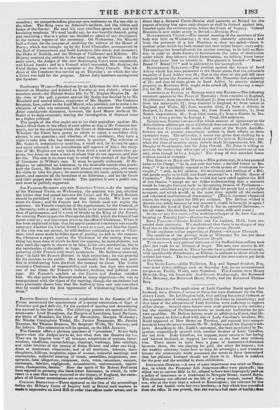PORTSOREN Wann.—The election for an Alderman for this ward corn -
menced on Monday, and finished on Tuesday at two o'clock ; when the numbers stood—for Michael Scales 169, for W. Hughes Hughes 74. At the close of the poll, a protest against Mr. Scales was handed in by Mr. Boustield and several others, supporters of Mr. Hughes. The Common Sergeant, Law, called on the Lord Mayor, who presided, not to make a de- claration of who was returned, but simply to announce the numbers. After considerable discussion, however, the Lord Mayor declared Mr. Scales to be duly returned ; leaving the investigation of disputed votes to a higher tribunal.
The people of the City ought not to let their prejudices against Mr. Scales blind them to the effect of such advice as that of Mr. Common Ser- geant, nor to the advantage which the Court of Aldermen may take of it. Whether the Court have power to admit or reject a candidate duly elected, is one question ; and whether, of two candidates, they have a right to take him who has fewest votes, is another. The rejection of 111r. Scales is, comparatively speaking, a small evil, for he can be again and again returned, if his constituents still approve of him ; the recep- tion of Mr. Hughes not only takes from them a man of whom they ap- prove, but foists on them a man of whom they do not approve, and that for life. The case is an exact copy in small of the conduct of the House of Commons in Wilkes's case. It must be equally withstood. If Mr. Hughes be admitted an Alderman, by the miserable coterie that consti- tute the Court, Mr. Scales must still attend every court-day, and assert his claim to take his place; he must summon his ward, preside at ward- /notes, and exercise all the functions of an Alderman ; and let the Court and their puppet seek their remedy. The question is now a public one, and must be publicly supported.
SIR FRANCIS 13URDETT AND THE NATIONAL UNION.—At the meeting of the National Union, on Wednesday, the question was put, whether the letters that had passed between the Union and Sir Francis Burdett should be published : it was carried that they should. We have not room for them ; and Sir Francis and his friends need not regret the omission. Sir Francis complains of the appointment, by the Council, of a Secretary, with a salary, which he holds to be tantamount to a resolu- tion of permanence, and of a vote of thanks to the King of the French for creating Peers to pass the Peerage-for-life-Bill, which the Council had never come to ; and thereupon gives up the office of Chairman. When it has been explained to him, that the appointment of a secretary was equally necessary whether the Union lasted a week or a year, and that the report of the vote was not correct, he still declines coutinuing to act as Chair- man, until some mode be fallen upon of putting an end to the rumour. So, whenever a report reaches the Chairman of the society that any thing has been done of which he does not approve, he must abdicate, not only until the report is shown to be false, to his own satisfaction, but to the satisfaction of the public at large. The Council did not treat this paltering of Sir Francis with much tenderness. Mr. Galloway observed, that " he held Sir Francis Burdett in high estimation ; he was grateful for his services to the public. But undoubtedly Sir Francis was justi- fied in withdrawing from the chair the moment he chose. The Union wanted a Chairman of respectability and rank, but they also wanted one of ten times Sir Francis's industry, decision, and political cou- rage. Sir Francis's conduct at the Crown and Anchor satisfied him. On that point the Baronet made so many objections,—he was so unacquainted with the object of the meeting, though the resolutions had been previously shown him, that Mr. Galloway then saw and remarked
• that he would take the first opportunity of withdrawing himself from them."


























 Previous page
Previous page